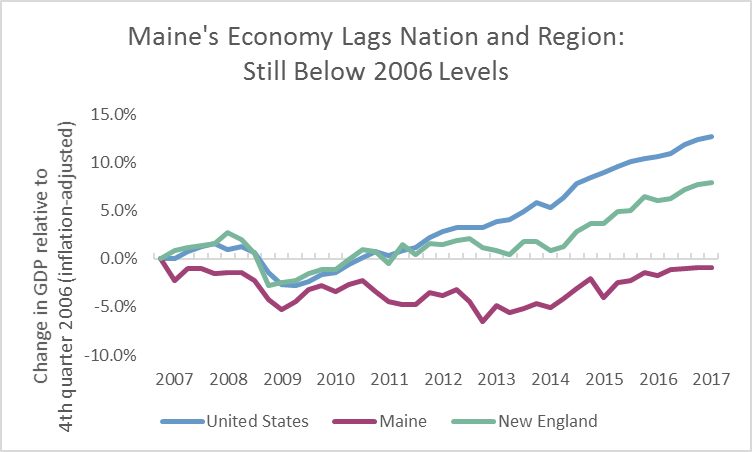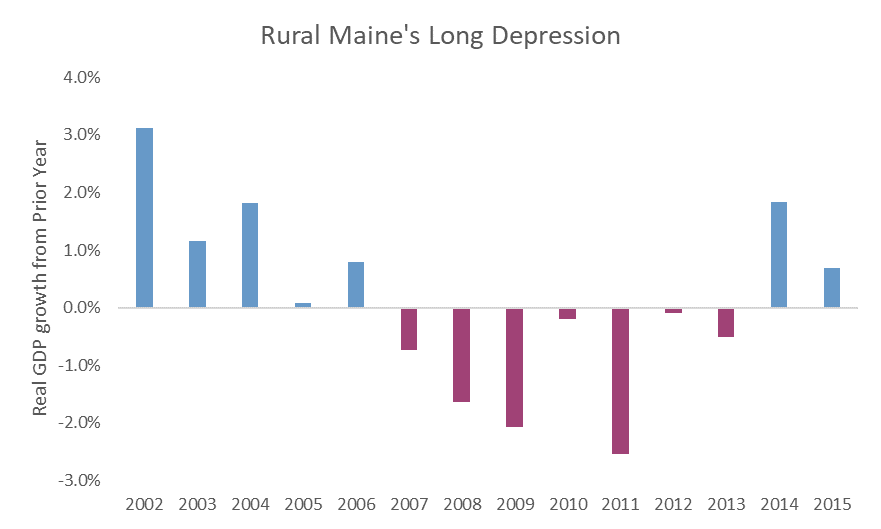New data released by the US Bureau of Economic Analysis provide more evidence of Maine’s lackluster economy, and the failure of policies pursued by Governor LePage and his allies. In the first quarter of 2017, Maine’s economy saw no real growth. Zero. That was the lowest rate in New England, and the seventh-worst performance of any state. These new data are just the latest in a series of indicators that demonstrate just how much of a failure LePage’s economic legacy will be, especially for rural Maine.
Economic growth is not like the weather. Lawmakers are not powerless to affect change – to encourage growth, and ensure that its gains are shared fairly. Governor LePage and his legislative allies have held Maine’s economy back by favoring wealthy Mainers over hardworking families, and opposing investments in our infrastructure, and our education system. The mantra of small government has not only hurt working Mainers, but also stymied the state’s job growth. The governor and his administration have even turned away nearly $2 billion in outside funding that would have stimulated our economy. The results of those disastrous policies are becoming increasingly clear.

Maine’s economy is still smaller, in real terms, than it was in 2006. The state has seen more than a decade of lost economic growth, even as the nation and our New England neighbors have recovered from the Recession and continued to grow their economies. Maine’s real Gross Domestic Product (GDP) is still 1% below its pre-Recession high in the second quarter of 2006. In contrast, New England’s total real GDP is 8% higher, and national GDP is 13% higher. When the economy is stagnant this long, there’s little room for wage growth, or job creation, and state revenues struggle to keep pace with need.
To make matters worse, any economic growth Maine has seen has been concentrated in the southeastern portion of the state. In the Portland-South Portland Metropolitan Area (which the BEA defines as all of York, Cumberland and Sagadahoc Counties), GDP has bounced along somewhat unsteadily, but is at least 2% above the 2006 high-water mark. In contrast, the economy in the rest of Maine entered a tailspin in 2006 from which it is just beginning to pull up. Real Gross Domestic Product in this area is a full 5% below 2006 levels.

The economy’s nosedive in rural Maine is so steep and deep that it represents an economic depression for the region. Economists typically define a recession as two consecutive quarters of real GDP decline, and a depression as four consecutive quarters of decline. The BEA does not produce quarterly GDP estimates below the state level, but the annual estimates imply that outside the Portland-South Portland Metro area, Maine has seen a very prolonged recession, resulting in seven years of declining economic growth. By way of contrast, the Great Depression of 1929 resulted in just four years of consecutive GDP losses.

These bleak GDP data show that Maine still has a long way to go to recover from the recession, and that rural Maine is being left behind. The majority of the state’s population still lives outside the Portland-South Portland area, but people in these areas have been excluded from almost all the economic growth in recent years. Workers need good-paying jobs to replace the many losses in the pulp and paper industries, opportunities to retrain with new skills, and families need to experience real wage growth for the first time in a decade.
The recipe for economic growth is clear. All Maine children need to benefit from a world-class education system. Mainers need to be able to go to college debt-free. The state must attract and retain young talent in any way it can, including helping with the burden of student debt. Mainers need affordable health care to be at their most productive, and the security of being able to take family leave to care for their loved ones.
Governor LePage’s ideology and policy decisions have prolonged an economic recession into a new great depression for rural Maine. It will be up to the next governor and legislature, and the voters who elect them, to set an agenda which will repair the damage and breathe new life into this part of the state.



